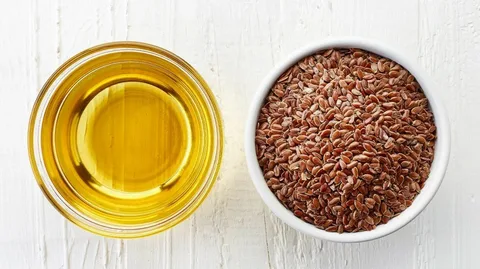Introduction
Flax seeds, also known as linseeds, have gained widespread recognition for their potential health benefits, particularly in managing diabetes and promoting overall well-being. Rich in fiber, omega-3 fatty acids, and lignans, flax seeds and flaxseed oil offer a range of nutritional properties that may support blood sugar control, insulin sensitivity, and cardiovascular health. In this comprehensive guide, we will explore the science behind flax seeds and flaxseed oil for diabetes management, discussing their potential benefits, recommended dosage, culinary uses, and potential side effects. Whether you’re looking to incorporate flax seeds into your diet or curious about the role of flaxseed oil in diabetes care, this guide has you covered.
Understanding Flax Seeds and Flaxseed Oil
Introduction to Flax Seeds
Overview of flax seeds, including their nutritional composition, historical use, and cultivation practices.
Exploring Flaxseed Oil
Introduction to flaxseed oil, extracted from flax seeds, and its unique composition of omega-3 fatty acids, omega-6 fatty acids, and other bioactive compounds.
Nutritional Benefits of Flax Seeds and Flaxseed Oil
Rich Source of Omega-3 Fatty Acids
Discussion of flax seeds’ high omega-3 fatty acid content, including alpha-linolenic acid (ALA), and its potential role in reducing inflammation and improving cardiovascular health.
High Fiber Content
Explanation of flax seeds’ soluble and insoluble fiber content, which may help regulate blood sugar levels, promote satiety, and support digestive health.
Lignan Content
Exploration of lignans, phytoestrogens found in high concentrations in flax seeds, and their potential antioxidant and anti-inflammatory effects.
Flax Seeds and Blood Sugar Control
Impact on Blood Glucose Levels
Examination of clinical studies investigating the effects of flax seeds and flaxseed oil on blood glucose levels and glycemic control in individuals with diabetes or prediabetes.
Insulin Sensitivity
Discussion of flax seeds’ potential to improve insulin sensitivity and reduce insulin resistance, potentially lowering the risk of complications associated with diabetes.
Incorporating Flax Seeds and Flaxseed Oil into Your Diet
Whole Flax Seeds
Creative ways to incorporate whole flax seeds into your diet, including adding them to smoothies, yogurt, oatmeal, baked goods, and salads.
Ground Flax Seeds
Tips for grinding flax seeds to enhance their digestibility and maximize nutrient absorption, along with recipe ideas for incorporating ground flax seeds into meals and snacks.
Flaxseed Oil Supplementation
Choosing a Quality Supplement
Guidelines for selecting a high-quality flaxseed oil supplement, including considerations such as purity, freshness, and extraction method.
Dosage Recommendations
Recommended dosage guidelines for flaxseed oil supplementation for individuals with diabetes, based on available research and expert recommendations.
Safety and Potential Side Effects
Allergies and Sensitivities
Awareness of potential allergic reactions or sensitivities to flax seeds or flaxseed oil, particularly in individuals with allergies to other seeds or nuts.
Digestive Effects
Discussion of potential digestive side effects associated with high fiber intake from flax seeds, including bloating, gas, and gastrointestinal discomfort.
Frequently Asked Questions (FAQs)
Can flax seeds or flaxseed oil help lower blood sugar levels in people with diabetes?
While research suggests that flax seeds and flaxseed oil may have potential benefits for blood sugar control and insulin sensitivity, more studies are needed to confirm their efficacy as a standalone treatment for diabetes.
How much flaxseed or flaxseed oil should I consume daily for diabetes management?
The recommended dosage of flax seeds or flaxseed oil for diabetes management varies, but generally ranges from 1 to 2 tablespoons of ground flax seeds or 1 to 2 grams of flaxseed oil per day. However, individual needs may vary, so it’s essential to consult with a healthcare professional for personalized recommendations.
Are there any interactions between flaxseed or flaxseed oil and diabetes medications?
Flax seeds and flaxseed oil may interact with certain diabetes medications, particularly those that lower blood sugar levels or affect blood clotting. It’s important to consult with a healthcare provider before adding flaxseed or flaxseed oil to your regimen, especially if you are taking medication for diabetes or other health conditions.
Can flaxseed oil be used for cooking?
Flaxseed oil has a low smoke point and is susceptible to oxidation when exposed to heat, making it unsuitable for cooking at high temperatures. It’s best to use flaxseed oil as a finishing oil for salad dressings, dips, or drizzling over cooked dishes.
Are there any contraindications for using flaxseed or flaxseed oil?
Individuals with certain medical conditions, such as bleeding disorders, hormone-sensitive cancers, or gastrointestinal disorders, should use caution when consuming flax seeds or flaxseed oil and consult with a healthcare professional before incorporating them into their diet.
Can flax seeds or flaxseed oil be consumed during pregnancy or breastfeeding?
Flax seeds and flaxseed oil are generally safe for consumption during pregnancy and breastfeeding and may offer nutritional benefits. However, it’s essential to consult with a healthcare provider for personalized guidance, as individual needs and considerations may vary.
How should flax seeds and flaxseed oil be stored to maintain freshness and quality?
Flax seeds and flaxseed oil should be stored in a cool, dark place away from heat, light, and moisture to prevent oxidation and rancidity. Whole flax seeds can be stored in an airtight container in the refrigerator or freezer for extended shelf life, while flaxseed oil should be refrigerated after opening and consumed within a few months for optimal freshness.
Conclusion
Flax seeds and flaxseed oil offer a wealth of nutritional benefits that may support diabetes management and overall health. By understanding the science behind these powerhouse seeds and oils, as well as their potential applications in culinary and therapeutic contexts, individuals with diabetes can make informed decisions about incorporating them into their diet and lifestyle. With proper dosage, mindful consumption, and consultation with healthcare professionals as needed, flax seeds and flaxseed oil can be valuable allies in the journey toward better blood sugar control, enhanced well-being, and long-term health.
- The Dangers Of Gaslighting In Relationships And How To Recognize It - May 30, 2025
- Recognizing Emotional Abuse: Beyond Physical Harm - May 30, 2025
- How To Navigate Love When You Are Demigender - May 29, 2025


